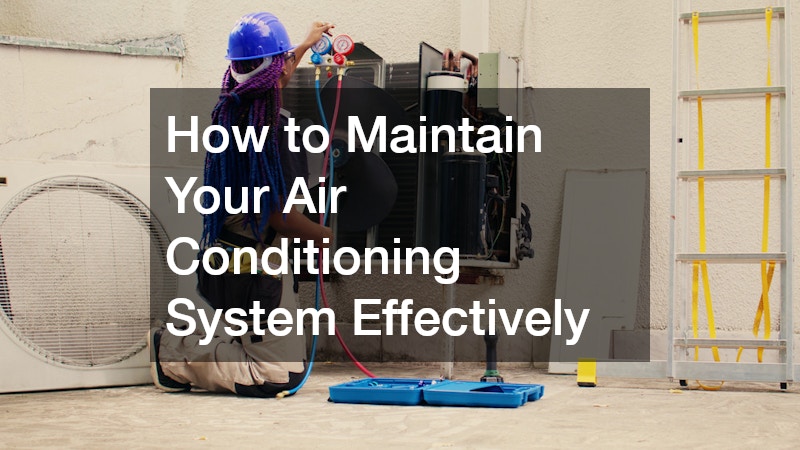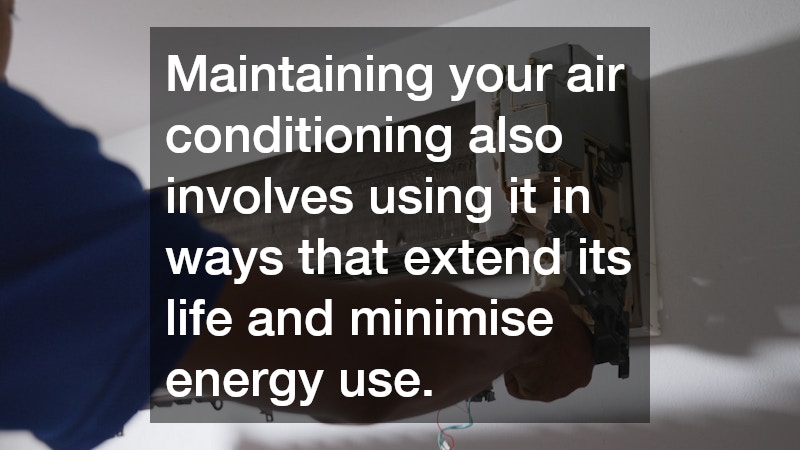How to Maintain Your Air Conditioning System Effectively

A well-maintained air conditioning system is essential for staying comfortable during Australia’s long, hot summers. Whether you rely on a split system at home or a ducted setup for larger spaces, regular maintenance helps ensure your unit runs efficiently, uses less energy and lasts longer.
By understanding the basic care needs of your air conditioning system, you can avoid costly repairs and unexpected breakdowns while keeping your indoor environment healthy and cool.
Clean or Replace Filters Regularly
One of the simplest yet most important maintenance tasks is cleaning or replacing the air filters. Filters collect dust, pollen and debris that would otherwise circulate throughout your home. Over time, clogged filters reduce airflow and force your system to work harder, which can lead to higher power bills and system wear.
Most manufacturers recommend checking your filters once a month during periods of heavy use. If you live in a dusty area or have pets, you may need to do it more frequently. Depending on the type of filter, you can either wash and reuse it or replace it entirely. Always consult your user manual to follow the correct method.
Clean filters not only improve the efficiency of your air conditioning but also help maintain indoor air quality—especially important for households with asthma or allergies.
Keep the Outdoor Unit Free from Obstructions
The outdoor unit of your air conditioning system plays a key role in releasing heat and regulating indoor temperatures. For it to perform efficiently, it needs adequate space and ventilation. Leaves, branches, dirt and even garden furniture can accumulate around the unit and restrict airflow, forcing the system to work harder than necessary.
Every few weeks, take a moment to inspect the area around your outdoor unit. Clear away debris, trim back nearby plants and ensure there’s at least half a metre of space on all sides. If the fins on the condenser coil appear bent or clogged, you can use a soft brush or vacuum cleaner with a nozzle attachment to gently clean them.
Taking care of the external parts of your air conditioning system helps it cool more effectively and prevents overheating during peak use.
Schedule Annual Professional Servicing
While DIY maintenance plays an important part in air conditioning upkeep, a licensed technician should inspect your system at least once a year. Professional servicing includes checking refrigerant levels, inspecting wiring, testing thermostats and ensuring the motor and fan are functioning correctly.
Technicians have the training and tools to spot potential problems before they become major issues. For example, a minor refrigerant leak may not cause immediate concern but can severely impact system performance and lead to expensive repairs if ignored.
Servicing is best done before summer hits. That way, your unit is in top condition when you need it most. A well-maintained system not only cools better but also saves you money by operating more efficiently.
Check for Unusual Noises or Smells
Air conditioning systems usually operate with a steady hum. Any new or unusual noises—such as banging, grinding or whistling—can be a sign something’s wrong. These could point to issues with the fan, motor or internal parts that need immediate attention.
Similarly, unpleasant smells coming from the vents may signal mould growth inside the unit or clogged drainage lines. A musty smell could indicate moisture is building up where it shouldn’t. Turning off the unit and inspecting the drain pan or internal components can help identify the source. If in doubt, call a technician.
Paying attention to how your air conditioning sounds and smells can help you catch problems early and avoid complete system failures.
Optimise Usage for Better Efficiency
Maintaining your air conditioning also involves using it in ways that extend its life and minimise energy use. Setting your thermostat to a consistent temperature, ideally between 24–26°C, reduces strain on the unit. Avoid setting it too low just to cool your space faster—it won’t work quicker but will force the system to use more power.
Using ceiling fans can help distribute cool air more effectively, allowing you to run your system at a more moderate setting. Closing blinds or curtains during the hottest parts of the day can also reduce indoor heat and make your air conditioning more effective.
It’s a good habit to turn off the unit when it’s not needed, such as during cooler evenings or when the house is empty. Smart thermostats and timers can make this even easier by allowing you to schedule usage based on your routine.
Final Thoughts
Looking after your air conditioning system doesn’t need to be complicated. With simple habits like cleaning filters, checking outdoor units and scheduling professional servicing, you can keep your system running smoothly all year round.
Regular maintenance not only improves performance but also extends the lifespan of your unit and helps you avoid costly breakdowns. Combine that with mindful usage and you’ll enjoy cool, efficient comfort even on the hottest summer days.
Whether you’re a homeowner or a renter, taking the time to care for your air conditioning will always pay off in reliability, comfort and savings.
